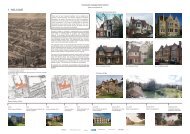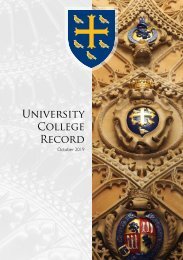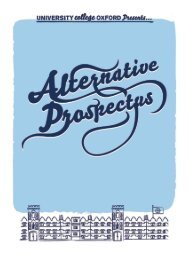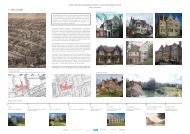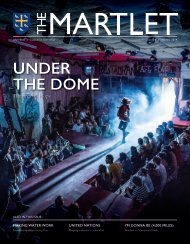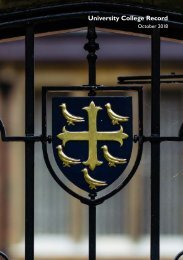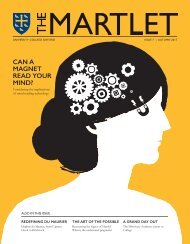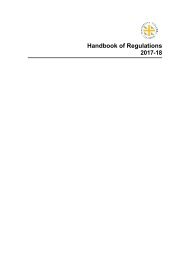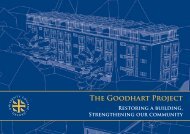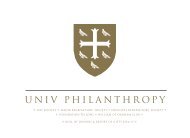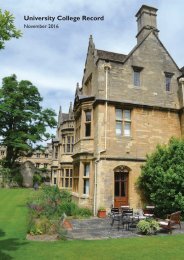Create successful ePaper yourself
Turn your PDF publications into a flip-book with our unique Google optimized e-Paper software.
Old Members<br />
1936<br />
HANS MICHAEL KARL NUSSBAUM (LATER NOAM) (Aldenham) died on 15 October<br />
2013 aged 94. Michael Noam came up to <strong>Univ</strong> to read Agriculture, getting a First.<br />
Michael was born in Germany, but he and his family had emigrated to Palestine after<br />
1933. Because of his birth, Michael, who was still in Britain when the Second World<br />
War broke out, found himself interned as an enemy alien on the Isle of Man for several<br />
months, despite the best efforts of our then Master, Sir William Beveridge, to get him<br />
released quickly. After the war he went to live in Israel where he worked for many years<br />
in the Israeli Central Bureau of Statistics as an agricultural economist. He was also a<br />
part-time lecturer at the Hebrew <strong>Univ</strong>ersity. He retired in 1981 to become a tour guide,<br />
specialising in developing tours for bird-watchers. In 1999 he published The Guide for<br />
Guides: A Tour Guide Manual.<br />
PETER LADE OLDFIELD (Lancing) died on 18 May <strong>2017</strong> aged 99. The news of Peter<br />
Oldfield’s death reached us just as this year’s <strong>Record</strong> was being prepared for publication,<br />
and so we hope to include a fuller tribute in next year’s issue.<br />
1937<br />
CHARLES RAYMOND RADCLYFFE (Eton) died on 1<br />
February <strong>2017</strong> shortly before his 98th birthday. He came up<br />
to <strong>Univ</strong> to read Agriculture, but went down for war service<br />
in 1939. During the war he joined the Royal Scots Greys<br />
and served, mainly as a tank commander, in North Africa,<br />
South Africa, Italy (where he took part in the Salerno<br />
landings), and Normandy, being mentioned in despatches.<br />
After the war, he was posted to Sandhurst as an instructor,<br />
and might have remained in the army for longer, but in<br />
1946, on the early death of his father, he left the army to take on the management of<br />
the family’s farm at Lew House, near Bampton. There he devoted himself to horses.<br />
He would purchase yearlings, mainly from Ireland, and break them in and sell them<br />
on to be trained as racehorses as three or four year olds. Charles, known affectionately<br />
as “the Captain”, had a good eye for a horse, and many of his charges later enjoyed very<br />
successful careers. Among them were Corbiere, who won the Grand National in 1983,<br />
and The Dikler, who won the Cheltenham Gold Cup in 1973. For many years he looked<br />
after the Queen Mother’s young horses, much enjoying her regular visits to Lew, and in<br />
2002 was awarded the LVO for equestrian services. He also worked for a while with the<br />
Aga Khan. Charles was a keen hunter, riding with several local hunts. He also served<br />
as High Sheriff of Oxfordshire in 1968, and was Vicar’s Warden for nearly sixty years at<br />
his local church. Charles’s wife Helen died in 2010, but he is survived by his daughter,<br />
Sarah, a film producer, his two grandsons Sam and Callum, and his stepson, William,<br />
an amateur jockey. [We are very grateful to Charles’s daughter Sarah for her help in<br />
preparing this obituary].<br />
56<br />
1942<br />
RILEY ANTHONY “TONY” WINTON RUDD (Blundell’s) died on 29 May <strong>2017</strong> aged<br />
93. Tony Rudd originally came up to <strong>Univ</strong> as an RAF cadet, before going off to train in<br />
Canada and then join No. 305 Polish Bomber Squadron. During a sortie over Germany<br />
in April 1945, he was shot down by an American plane, and ended the war as a German<br />
prisoner. On being demobbed, he returned to <strong>Univ</strong> after the war in 1947 to read PPE.<br />
Tony was very fond of <strong>Univ</strong> and in later years acted for a while as the College’s stockbroker.<br />
After completing his degree, Tony became a graduate trainee at the Bank of England,<br />
and represented the Bank in the USA from 1952-3. In 1955, however, he changed career<br />
to become a journalist, working for the Manchester Guardian, from where he covered the<br />
Suez crisis as its shipping correspondent. He also became an assistant to the paper’s city<br />
editor, making his name as a financial journalist.<br />
In the 1960s, Tony turned to stockbroking, and to the business of helping smaller<br />
companies join the stock market. He first worked for the firm of Rowe & Reeve, which was<br />
refounded in 1969 as Rowe & Rudd. He acquired a reputation for his entrepreneurship,<br />
and Rowe & Rudd were an energetic presence in the stock market of the 1970s.<br />
The early 1980s were a less happy time for him. In 1981, Tony discovered that he was<br />
going to lose his sight, having been diagnosed with glaucoma and shingles. He was also<br />
criticised by the Department of Trade for his role in the affairs of a bank called Bryanston<br />
Finance, and after an investigation into the 1982 takeover of an investment firm partly<br />
owned by Rudd, he and a business partner were found “totally unfit to be directors.”<br />
In later years, however, Tony returned successfully to journalism, writing columns<br />
for both the Spectator and the Investors’ Chronicle. Gordon Screaton, <strong>Univ</strong>’s Estates<br />
Bursar from 1973-2001, was one of many people who read Tony’s lively reports with<br />
great interest. As his sight grew worse, he continued to enjoy opera and ballet, even as a<br />
listener, and would visit art exhibitions with his wife describing what was on show.<br />
In 1952, Tony married Ethne Fitzgerald, whom he had met when they had both been<br />
undergraduates together. She died in 2008, and Tony leaves a son and three daughters,<br />
one of whom, Amber, is currently the UK Home Secretary. He died in the middle of the<br />
recent General Election campaign, and Amber Rudd participated in a major television<br />
debate only two days after losing her father.<br />
1943<br />
TERENCE JOHN ORGAN (Brigg Grammar School) died on<br />
16 June 2016 aged 89. He had come up on a cadet course during<br />
the Second World War, and then returned to read History. His<br />
son Richard has kindly provided this tribute:<br />
After serving in the Queen’s Regiment from May 1944<br />
Terry returned to Oxford in the autumn of 1947 a man much<br />
broadened by his experience both in Britain and the Middle<br />
East. He married Edna Paxman on Saint George’s Day 1948<br />
and completed his History degree the following year.<br />
He joined Cadbury’s as a management trainee in 1949,<br />
with whom he was destined to spend the rest of his immensely<br />
57




